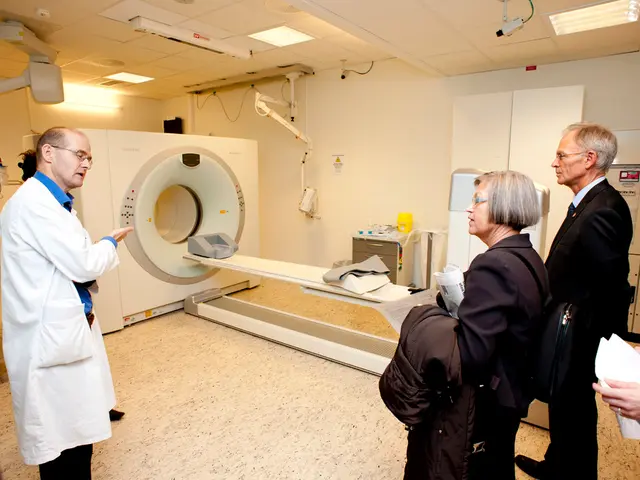Brain-Dead Pregnant Woman Kept Alive in Georgia: A Controversial Case Under the Heartbeat Law
Medical practitioners in the United States maintain brain-dead pregnant individuals through artificial means
Chatter on Facebook, Twitter, WhatsApp, Email, Print, and more, surrounding a pregnant woman in Georgia who's recently been declared brain-dead by doctors, but kept alive. The reason? Strict abortion laws in the state.
In the US state of Georgia, a pregnant woman, identified as a 30-year-old, is being artificially sustained, despite a brain death diagnosis. According to her family, the decision to keep her alive is due to the stringent abortion laws of the state. The aim is to preserve as much time as possible for the child's birth, with the due date still over three months away, potentially making this one of the longest such cases [AP].
As reported by multiple news outlets, Adriana Smith suffered from severe headaches and sought medical help at Northside Hospital in Atlanta. She was medically treated and later discharged. However, the following morning, her friend found her gasping for air. She was later diagnosed with a brain hemorrhage at Emory University Hospital. At the time of diagnosis, she was in her ninth week of pregnancy.
According to the family, the treating doctors informed them that, due to the strict abortion laws in Georgia, they could not terminate life-sustaining measures as the law bans abortions once a fetal heartbeat is detected – typically around the sixth week of pregnancy [1][4].
April Newkirk, Smith's mother, spoke to local TV station WXIA, stating that her daughter is now in her 21st week of pregnancy. She also reported that, according to doctors, the fetus has fluid in the brain. "She's pregnant with my grandson," said Newkirk, "but he may be blind, possibly not be able to walk, and may not survive after birth."
Monica Simpson, a Pro-Choice activist, commented that "Her family should have the right to make medical decisions. Instead, they've been subjected to traumatic experiences, high medical costs, and the cruelty of having no resolution and taking no steps towards healing."
There has been no response from Northside Hospital regarding AP's request for a statement. Emory Healthcare, which oversees Emory University Hospital, stated that they cannot comment due to data privacy regulations.
PoliticsIn a move that effectively makes such cases impossible, Wyoming has passed a new law requiring an ultrasound before medication abortion.
- Georgia
- Abortion
- USA
Enrichment Data:The specific abortion law in Georgia, which has contributed to a brain-dead pregnant woman being kept on life support against her family's wishes, is the Living Infants Fairness and Equality (LIFE) Act, also known as the "heartbeat" law. This law bans most abortions once a fetal heartbeat is detected, typically around six weeks of pregnancy, and allows limited exceptions for cases where the pregnancy is medically futile, if the mother's life is in danger, or in cases of rape or incest (if a police report has been filed)[1][4].
Key Aspects of Georgia's Abortion Law:
- Fetal Personhood Clause: This clause gives legal recognition to unborn children after a heartbeat is detected, which can complicate medical decision-making for severely ill or brain-dead pregnant women[1].
- Exceptions: The law includes exceptions for medical futility, life-threatening conditions, rape, or incest, but these exceptions are limited and often require additional legal or medical documentation[1][4].
- Impact on Medical Decisions: The law restricts medical providers' ability to make decisions, especially in cases where the prognosis for the fetus is poor. This can lead to situations where medical treatment is delayed or altered due to legal rather than medical considerations[2][4].
In the case of Adriana Smith, who was declared brain-dead while pregnant, the law's fetal personhood clause and the general restrictions on abortion have been cited as reasons for her continued life support, despite her family's wishes to end it[1][4].
- The controversial case of a brain-dead pregnant woman in Georgia, kept alive due to strict abortion laws, has sparked conversation on various community platforms, including policy discussions in politics and general news, as well as debates on mental health and health-and-wellness forums, touching upon topics such as women's health and menopause.
- Science and therapies-and-treatments communities have also expressed interest in the case, trying to understand the implications of the Georgia's Living Infants Fairness and Equality (LIFE) Act, also known as the "heartbeat law," on medical decision-making for brain-dead women pregnant with potential life-threatening conditions.
- In the midst of this, the war-and-conflicts and crime-and-justice sectors have expressed concerns over the potential long-term effects on the child, such as medical complications, and for the family who are forced to endure traumatic experiences, high medical costs, and legal uncertainties.
- The employment policy community may also scrutinize this case due to potential economic implications for the family, who might face job losses or other related issues because of their focus on caring for the brain-dead mother and the potentially handicapped child.
- On the other hand, the policy-and-legislation sector might consider amendments to the Georgia's LIFE Act to allow for more flexibility in cases like Adriana Smith's, providing a balance between preserving life and upholding the family's right to make medical decisions.
- Policymakers in other states, like Wyoming, are taking notice and implementing policies aligned with Georgia's LIFE Act, such as requiring ultrasounds before medication abortion, potentially fueling broader debates on reproductive rights and medical autonomy.








